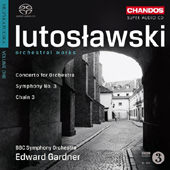
ESSENTIAL RECORDINGS

One of the major 20th century Polish composers, Witold Lutoslawski (1913-1994) has always been considered and highly regarded
as an individual composer, one who never adhered to any schools or trends or followed the inclinations of any new avant-garde
groups. Instead he was always a unique combination of past and future, which the three different orchestral works on this new
recording attest to and demonstrate very well. As with most composers of his generation, his artistic development was curtailed
during the war, at which time he earned a living by playing piano in cafés, but his activities quickly resumed afterwards for him
to become a conductor of major orchestras and a sought-after composer.
Of the three major works found on this CD, the Concerto for Orchestra from 1954, in my opinion, is the main
attraction and definitely one of the finest examples of mid-century music. Its second movement style is the only area in which
there is a very slight resemblance to Bartok's own Concerto for Orchestra written about ten years earlier, but that is where the
influence, if any, ends. The whole work actually reminds me more of Benjamin Britten, especially the opening of the first movement
Intrada, which sounds very much like a faster version of the Lacrymosa from Britten's Sinfonia
da requiem. Throughout its four movements, Lutoslawski demonstrates a strong grasp of development, in which he takes
various folk elements from his native country, and builds them into great orchestral edifices. A great example of just that, is the
Passacaglia, Toccata e Corale third movement, where within six minutes he presents a simple unison folk melody,
elevates it to grand proportions, and ends with the same lonely melody stretched out over solo strings. The whole work ends
with an impressive Allegro giusto / Presto that combines great orchestration with stupendous steam locomotive
momentum that leads to an exhilarating finish.
The other works on hand, the Symphony No. 3 and Chain 3, both written around 30 years
later, present a Lutoslawski speaking a different musical language, but still using solid form and orchestration to drive the music
home. Both works share a technique of overlapping different motivic subjects to create a somewhat large scale counterpoint effect,
but again it's Lutoslawski's solid grasp of momentum that holds the strands together that more or less paint the bigger picture.
This new Chandos recording is the Volume 1 in a brand new series dedicated to Polish music, and based on
this label's track record, it should prove to be a fascinating collection of recordings. This first volume in the series provides a
captivating look at one of Poland's finest composers, with the BBC Symphony Orchestra in great form under
the solid leadership of conductor Edward Gardner.
Jean-Yves Duperron - October 2010